Q&As with some of the former graduate students, postdocs, and technicians who made their mark on our Center and have gone on to exciting new careers!
A few of our CABBI alumni
 Yalin Li was a Postdoc/Research Scientist in CABBI’ Sustainability Theme from 2019-2023, working with Sustainability Co-PI Jeremy Guest at the University of Illinois Urbana-Champaign.
Yalin Li was a Postdoc/Research Scientist in CABBI’ Sustainability Theme from 2019-2023, working with Sustainability Co-PI Jeremy Guest at the University of Illinois Urbana-Champaign.
What was the focus of your research at CABBI?
I worked on design and economic/environmental impact analyses of biorefineries/bioenergy and bioproducts.
What did you enjoy most about working with CABBI?
Collaborating with and getting to know researchers working on all sectors of the bioeconomy.
Where are you working now? Tell us about your job or research focus.
I am an Assistant Professor at Rutgers University-New Brunswick. I’m most interested in (i) thermochemical and catalytic technologies for resource recovery, and (ii) sustainable design and decision-making.
How did your CABBI experience influence what you are doing now, and your career overall?
I would say everything that I worked on during my time at CABBI paved the way for what I am doing now. I have continued this interdisciplinary work that uses agroecosystem, hydrology, and economic models to address questions about many ecosystem services and the Food-Energy-Water nexus.
More thoughts about your time at CABBI?
My experiences at CABBI directly contributed to the establishment of my research theme in sustainable design and decision-making.
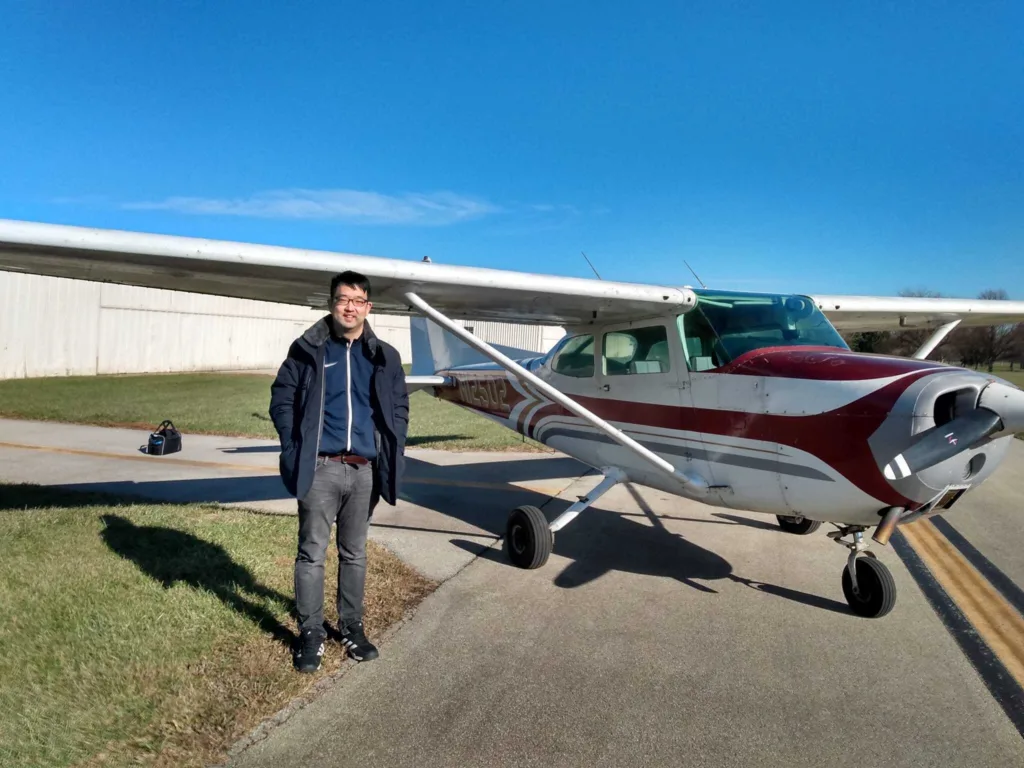 Kisurb Choe was a Ph.D. student in CABBI’s Conversion Theme from 2017 to 2023, working with Conversion PI Jonathan Sweedler at the University of Illinois at Urbana-Champaign.
Kisurb Choe was a Ph.D. student in CABBI’s Conversion Theme from 2017 to 2023, working with Conversion PI Jonathan Sweedler at the University of Illinois at Urbana-Champaign.
What was the focus of your research at CABBI?
I developed a chemical screen that found improved enzymes for biofuel production. For this, I developed new methods for chemical measurements to find desired mutants from thousands of samples in an economic and efficient manner. This chemical measurement approach is called mass spectrometry, and I accelerated the measurement by developing control software, sample preparation methods, and some biological approaches.
What did you enjoy most about working with CABBI?
Being able to get help from and contribute to works of great scientists around the country was an amazing experience, and collaboration with them resulted in great work that I couldn’t even dream of when I started as a grad student. CABBI is an interdisciplinary team that let me learn from so many diverse fields, all the way from soil scientists, bioprocess engineers, biofoundry gurus, enzyme experts, and ecosystem modelers to economists.
Where are you working now? Tell us about your job or research focus.
I work as a postdoctoral research associate at Pacific Northwest National Laboratory in Washington State. I apply mass spectrometry approaches to help create a molecular atlas of human organs and develop mass spectrometry instruments to enable novel studies.
How did your CABBI experience influence what you are doing now, and your career overall?
I got hired for the skills I developed performing CABBI research projects, so the work directly shaped my current work and career step.
More thoughts about your time at CABBI?
I really appreciate the opportunities and experiences that I had through CABBI. Also, touring the CABBI research farms on a tractor was a lot of fun!
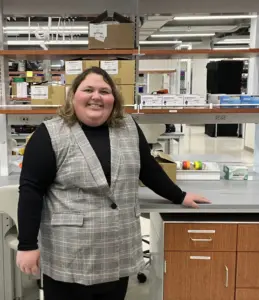
Emma Brace was a Postdoctoral Research Associate in CABBI’s Sustainability Theme from August 2020 to June 2023, working with Co-PI Jeremy Guest at the University of Illinois Urbana-Champaign.
What was the focus of your research at CABBI?
Techno-economic analysis (process costs) and life cycle assessment (environmental impacts) of new biofuels, bioproducts, and the processes to make them.
What did you enjoy most about working with CABBI?
The collaborative environment and the people.
Where are you working now? Tell us about your job or research focus.
I am an assistant professor in the Human-Centered Engineering department at Boston College. My research still focuses on biofuels and bioproducts. In the lab, we develop new bioseparations methods for isolating compounds of interest for use as bioproduct building blocks. On the modeling side, we use molecular modeling, process design, TEA, and LCA to better characterize a bioproduct’s potential in terms of sustainability (economic and environmental).
How did your CABBI experience influence what you are doing now, and your career overall?
It helped prepare me to become a tenure-track faculty member and gave me insight into grant-writing, collaboration, and more.
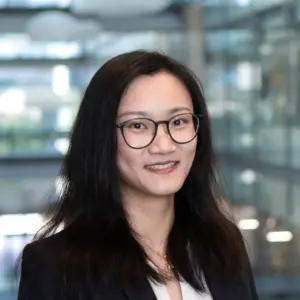 Yihui Shen was a Postdoctoral Research Associate in CABBI’s Conversion Theme from 2018 to 2023, working with Co-PI Joshua Rabinowitz at Princeton University.
Yihui Shen was a Postdoctoral Research Associate in CABBI’s Conversion Theme from 2018 to 2023, working with Co-PI Joshua Rabinowitz at Princeton University.
What was the focus of your research at CABBI?
Understanding the physiological metabolism of yeasts and how it is regulated.
What did you enjoy most about working with CABBI?
I enjoyed the collaborative environment in which people are happy to share thoughts and reagents and everyone’s opinion is valued.
Where are you working now? Tell us about your job or research focus.
I am now an Assistant Professor of Bioengineering at the University of Pennsylvania. My lab focuses on developing tools for measuring single cell metabolism and understanding metabolic regulation in health-relevant contexts.
How did your CABBI experience influence what you are doing now, and your career overall?
My training was in chemistry, but my postdoc research with CABBI allowed me to approach biological systems from a systems and engineering perspective. It also helped me realize how powerful multi-omics tool was for rapid understanding of a novel biological system.
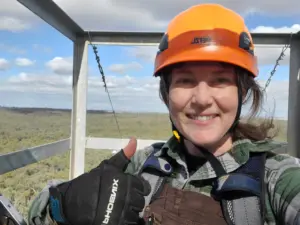 Caitlin Moore was a Postdoctoral Research Associate in CABBI’s Sustainability Theme from 2017-2020, working with Co-PI Carl Bernacchi at the University of Illinois Urbana-Champaign.
Caitlin Moore was a Postdoctoral Research Associate in CABBI’s Sustainability Theme from 2017-2020, working with Co-PI Carl Bernacchi at the University of Illinois Urbana-Champaign.
What was the focus of your research at CABBI?
Management of the flux towers used for field-scale observation of the bioenergy cropping systems in Illinois (sorghum, maize/soybean, miscanthus) and Florida (sugarcane).
What did you enjoy most about working with CABBI?
The large team of people.
Where are you working now? Tell us about your job or research focus.
I am now employed as an Assistant Professor (Lecturer) at The University of Western Australia. I continue to manage flux towers in both agricultural and native ecosystems, as part of Australia’s Terrestrial Ecosystem Research Network (TERN) in this role.
How did your CABBI experience influence what you are doing now, and your career overall?
Working as part of CABBI gave me the opportunity to build an international research network and produce high-impact research publications that have been widely cited for my career stage. The training and professional development opportunities made available to me via CABBI have also helped me with navigating an academic job, which can be quite challenging yet rewarding.
More thoughts about your time at CABBI?
CABBI was a great center to be part of, not just for its academic people and input, but also from the professional and administrative staff who help coordinate the day-to-day operation and communications of our work. Thanks for supporting us!
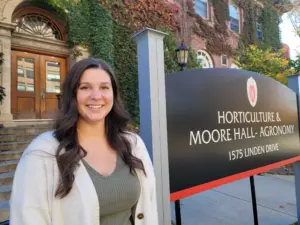 Kelsie Ferin was a Ph.D. student in CABBI’s Sustainability Theme from 2017 to 2020, working with Sustainability Co-PI Andy Van Loocke at Iowa State University.
Kelsie Ferin was a Ph.D. student in CABBI’s Sustainability Theme from 2017 to 2020, working with Sustainability Co-PI Andy Van Loocke at Iowa State University.
What was the focus of your research at CABBI?
I used an agroecosystem model (Agro-IBIS) and hydrology model (THMB) to assess the implications of the Renewable Fuel Standard (RFS) on water quality (i.e., nitrogen loss) in the Mississippi River Basin and at the outlet to the Gulf of Mexico. We looked at multiple scenarios which varied in land use, fertilizer application rates, and types of plant cover for cellulosic biofuel (i.e., corn stover or miscanthus/switchgrass) that was determined by the economic model (BEPAM) from the Khanna Lab.
What did you enjoy most about working with CABBI?
I really enjoyed the interdisciplinary research I was able to conduct while here. Being able to collaborate with research teams in different fields was also key to developing my research and career goals. I also enjoyed the retreats that were held and the frequent meetings that kept everyone connected.
Where are you working now? Tell us about your job or research focus.
I am a research scientist working on an INFEWS grant (Innovations at the Nexus of Food, Energy and Water Systems) called FEWscapes out of University of Wisconsin – Madison. I currently run Agro-IBIS and THMB to simulate historical and future climate and land use conditions across the Upper Mississippi River Basin to answer questions related to food, energy, water, and ecosystem services. I also work on another INFEWS grant led by Purdue in which I run Agro-IBIS simulations under future climate conditions and provide output to the group that runs an economic model (SIMPLE-G) to address questions relating to fertilizer application rate changes and nitrogen leaching losses under future conditions.
How did your CABBI experience influence what you are doing now, and your career overall?
I would say everything that I worked on during my time at CABBI paved the way for what I am doing now. I have continued this interdisciplinary work that uses agroecosystem, hydrology, and economic models to address questions about many ecosystem services and the Food-Energy-Water nexus.
More thoughts about your time at CABBI?
CABBI was a great BRC to work for, and I will forever be grateful for my time here! I made many connections that will be continued throughout the duration of my career.